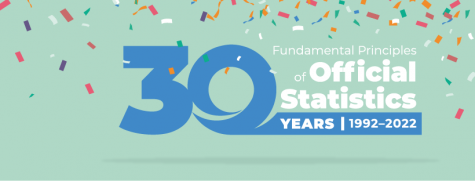
2022 marks 30 years since the Fundamental Principles of Official Statistics were first developed and adopted at UNECE. The United Nations Statistical Commission adopted these principles in 1994 at the global level. The Economic and Social Council (ECOSOC) endorsed the Fundamental Principles of Official Statistics at policy level in 2013; and in January 2014, they were adopted by the General Assembly.
The principles underlie everything that the producers of official statistics do: from the methods for collecting, processing and storing data to the ways that statistical offices disseminate statistics and communicate with those who use them.By marking this anniversary, statistical offices across the region are recognizing the continued and increasing importance of the Principles in guiding what they do. Thirty years on, they remain a collective manifesto for serving society with impartial, relevant and accurate information to guide decisions.
From January to June 2022, the Conference of European Statisticians was celebrating the Fundamental Principles through a series of country-led communications campaigns telling a shared story about the importance and impact of each Fundamental Principle on society and everyday life and why they matter.
All countries, organizations, members of the statistical community and users of statistics are welcome to participate in this joint celebration. Share your experiences and examples relating to the principles on your social media platforms, websites and other outlets, using the hashtags #FPOS30 (for the campaign overall); #cesUNECE (to refer to the Conference of European Statisticians) and the full words "Fundamental Principles of Official Statistics" in social media posts wherever possible.
Visit the new anniversary website to discover many of the materials, experiences and examples that countries, organizations, members of the statistical community and users of statistics prepared as part of this joint celebration or click here to follow the campaign on Twitter.
Why do each of these Principles matter?
- Principle 1: Relevance, impartiality and equal access
-
Campaign led by Statistics Canada from 31/01 to 11/02
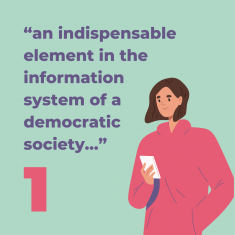
"Official statistics provide an indispensable element in the information system of a democratic society, serving the government, the economy and the public with data about the economic, demographic, social and environmental situation. To this end, official statistics that meet the test of practical utility are to be compiled and made available on an impartial basis by official statistical agencies to honour citizens' entitlement to public information."
So much is enshrined in just a few words!
The producers of official statistics must strive to serve society with the information people need and want. Only if statistics meet the test of practical utility can they be considered relevant. Utility can be frustrated by many barriers—figures that come too late to be useful, are published in lengthy books or hard-to-read graphs, are hard to locate on websites, or that lack the necessary explanations to help users know what they mean.
Ensuring relevance entails reaching out to current and potential users to find out about their needs: on what topics do they need statistics? in which formats? when do they need them? Needs change over time, so NSOs maintain constant contact with stakeholders. When the Covid-19 pandemic struck, NSOs consulted widely to find out about and respond to rapidly changing demands for data. NSOs conduct user surveys and track usage of their products to keep tabs on their continued relevance.
Remaining impartial and safeguarding equal access are at the heart of official statistics. It is essential for statistical offices to be independent from governments, and free from political influence. Without these protections, citizens might be hesitant about participating in surveys or allowing their data to be used. If they perceive statistics to be linked to a government in whom their trust is limited, this might also undermine their trust in the figures. Official statistics respond to the needs of all types of users, not only those in authority; the data needs of the general public are just as legitimate as the data needs of governments, banks and businesses. This applies both to the choice of what statistics to produce, and the timing of release of statistics. No-one gets privileged access to figures, and no-one can tell the NSO to withhold them from public access.
Impartial official statistics don’t only help to build trust in the NSOs themselves—they contribute to a wider social goal of fostering transparency and accountability, building an open relationship between society and states. If we can trust that NSOs are telling us the whole, real story, for example, about progress towards the SDGs—even in cases where that real story demonstrates poor progress or unsuccessful policies—we are better equipped to hold our policymakers to account.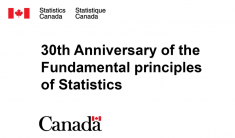
A video from the Chief Statistician of Canada, Mr. Anil Arora, along with various Canadian leaders, about the first principle in English and French.

A statement from the UNECE Executive Secretary, Ms. Olga Algayerova, calling on all countries to respect all the principles and to enable and support official statistics producers to adhere to them.
Share your examples on Twitter or Facebook or other social media using #FPOS30 and tagging @unecestat, @StatCan_eng and @StatCan_fr!
- Principle 2: Professional standards and ethics
-
Campaign led by Statistics New Zealand from 14/02 to 25/02

"To retain trust in official statistics, the statistical agencies need to decide according to strictly professional considerations, including scientific principles and professional ethics, on the methods and procedures for the collection, processing, storage and presentation of statistical data."
The work of official statistics is not just collecting data and crunching numbers. There is a whole chain of processes, from deciding what statistics are needed, hiring staff, designing surveys and identifying data sources, through gathering and processing data, to publishing and explaining the statistics.
Every link in this chain involves making decisions from among a range of options. In official statistics, these choices must be driven purely by professional motivations—never by political ones. While accountability to the taxpayer and value for money are also key considerations (as will be seen in Principle 3), this does not mean that cheapest is necessarily best. Scientific excellence, above all else, determines the methods official statisticians select to conduct their work. This includes statistical methods as well as those from the fields to which the statistics relate, such as economics, demography, and climate science, as well as ICT tools and modern communication techniques. Indeed, in fulfilling this principle, official statisticians strive not only to follow the best available scientific methods, but to work tirelessly to develop these methods.
As in any profession, applying professional ethics at every level from the individual staff members to the organization as a whole is essential to maintain the good reputation of the industry. Nowhere is this more true than for official statistics, where safeguarding this good image is crucial for maintaining public trust—which is essential both in order for respondents to continue providing the data needed for statistics, and in order that statistics are believed and used to their full potential.
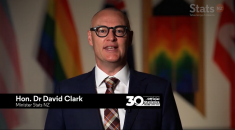
A video from Hon Dr David Clark, Minister of Statistics in New Zealand about the second principle in the Aotearoa New Zealand context.
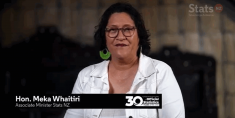
A video from Hon Meka Whaitiri, Associate Minister for Statistics in New Zealand, about the importance of professional standards and ethics as a basis of a trusted and inclusive statistical system.
Share your examples on Twitter or Facebook or other social media using #FPOS30 and tagging @unecestat and @Stats_NZ!
- Principle 3: Accountability and transparency
-
Campaign led by Statistics Finland and Central Statistical Bureau of Latvia from 28/02 to 11/03
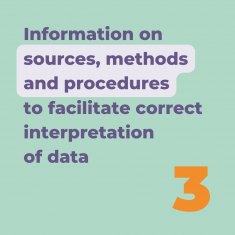
"To facilitate a correct interpretation of the data, the statistical agencies are to present information according to scientific standards on the sources, methods and procedures of the statistics."
Good governance in any organization calls for accountability and transparency. These words are so widely used that we might not even pay them much attention. But they are absolutely crucial for official statistics. Why?
Unless the processes and products of official statistics are totally transparent, they risk being useless – or worse, dangerous. Without knowledge of how they were made, people could accidentally or deliberately misinterpret them. To be able to interpret and apply statistics correctly, users need to know some key facts about them, called metadata—how were they gathered? When? Among what group of people? What were they asked? How were the raw data processed into the published statistics? As well as guiding correct interpretation, transparency fosters trust which, as we saw in Principle 2, is essential for statistics to be believable and useful. Producers of statistics want users to trust their numbers, but they don’t expect this to be blind trust – they know that they must earn it.
Statistics is often called the science of probability. Official statistics must therefore also be transparent about the probability attached to the figures they publish. How big and representative were the samples, and how confident can we be in the estimates? By publishing confidence intervals and quality assessments along with details of the methods used, producers of official statistics enable users to select appropriate statistics for their purposes and provide them with information on how to use and interpret them.
Being accountable to society goes far beyond publishing metadata. It entails being transparent and efficient in how public money is spent; ensuring a high level of professional capability among staff so that correct statistical methods are followed; and communicating with the public about the timing of statistical releases, revisions and correction of errors, and plans to start new statistical products or to change or discontinue existing ones.Blogs from Statistics Finland's Partnership and Ecosystem Relations service area: "Fundamental Principles of statistics into broader use in society" by Ms. Leena Storgårds and "How on earth to identify reliable data?" by Ms. Outi Ahti-Miettinen.
Share your examples on Twitter or Facebook or other social media using #FPOS30 and tagging @unecestat, @StatsFinland and @CSB_Latvia!
- Principle 4: Prevention of misuse
-
Campaign led by United Kingdom Statistics Authority from 14/03 to 25/03
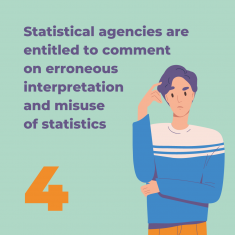
"The statistical agencies are entitled to comment on erroneous interpretation and misuse of statistics."
Statistics don’t have a great reputation in popular culture. Mark Twain famously said that the three kinds of falsehoods are “lies, damned lies, and statistics”. Against this common perception, the field of official statistics has its work cut out to build and maintain trust, making clear that far from lies, statistics offer the best and fairest insights into truth about our world and its people.
Doing this entails publicly correcting errors in the use and interpretation of statistics, whether deliberate or accidental. There are many kinds of errors, some of which are very common among journalists, politicians and others whose words hold much sway in public discourse. Figures might be chosen selectively, or ‘cherry-picked’, with those that illustrate the speaker’s point being emphasized while those that contradict it are set aside. Statistics designed to apply to a specific population group might be over-generalized and interpreted as applying to a whole population. Estimates surrounded by confidence intervals might be misinterpreted as absolutely precise figures. A short-term trend might be falsely extrapolated into the long term. All of these errors have been seen repeatedly in the past two years as statistics related to the Covid-19 pandemic suddenly entered daily conversation, with mainstream media and governments making use of statistics far more than they were used to doing before.
Principle 4 protects the right of statistical agencies to speak up when they see errors being made. This means that even when statistics are deliberately or accidentally misused by someone in a powerful position in government, official statisticians can set them straight without fear of reprisal.
In the eyes of many NSOs this principle is not merely a right, but also a duty. And for many, preventing misuse means not only reacting to actual misuse but being proactive to minimize potential future misuse. Hence, supporting the development of statistical literacy becomes an important tool in the NSO’s toolkit to tackle misuse. This is done through targeted training courses, offering statistical teaching support in schools and universities, partnering with or seconding experts to work with journalists, and producing guides and manuals for using, understanding and presenting statistics.Guest blog: Improving reporting and reducing misuse of ethnicity statistics by Mr. Richard Laux, Deputy Director, Data and Analysis, at the Equality Hub, of the United Kingdom Government Equalities Office.
Share your examples on Twitter or Facebook or other social media using #FPOS30 and tagging @unecestat and @UKStatsAuth!
- Principle 5: Sources of official statistics
-
Campaign led by DANE Colombia from 28/03 to 08/04
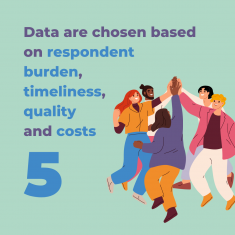
"Data for statistical purposes may be drawn from all types of sources, be they statistical surveys or administrative records. Statistical agencies are to choose the source with regard to quality, timeliness, costs and the burden on respondents."
Our world is awash with data: raw data about ourselves, the things we do, the places we go, our homes and the environment around us, our health, what we buy, the businesses in our towns and cities…
All of these data have the potential to be turned into meaningful statistics, but the costs, benefits and risks of doing so are different in each case; as are the methods needed to turn raw data into useful statistical information, the amount of time that transformation would take, how much involvement is needed from members of society and from statisticians; and how accurate and reliable the resulting statistics would be.
Principle 5 calls on statistical agencies to weigh up all of these different considerations when they decide what would be the best data source for any given kind of statistics. For example, it might be much quicker and cheaper to use data from one source, but less reliable or representative than data from elsewhere.
Gathering information from people in a survey might offer the benefits of greater detail and insight into their opinions, but ask too many questions and eventually people will tire of being asked to complete surveys, and might give incomplete or inaccurate answers.
On the flip side, when statistical agencies produce statistics from existing data sources such as tax records, electoral registers or supermarket scanners – which can be much faster and cheaper than conducting in-person surveys and censuses – they have to very carefully manage public perceptions. They must make sure that society knows exactly what they are doing and how, allaying any fears about how data are obtained and processed and any concerns about the quality of the figures.
Guided by this principle, NSOs weigh up the pros and cons of every potential data source. This is a constant process because, while continuity of statistics is one important factor, the best source today might not remain the best source forever, or for all kinds of statistics. NSOs are always moving with the times to select the right data for the job, harnessing the richness of newly-emerging sources and technologies to ensure they always strike the right balance between value for money, accuracy, timeliness and respondent burden.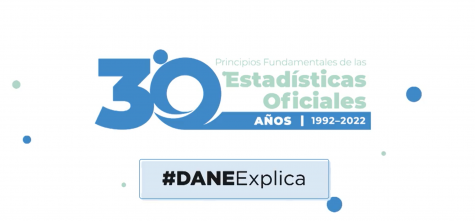
"Taking advantage of all the sources" - a video explaining Principle 5 from DANE Columbia
Share your examples on Twitter or Facebook or other social media using #FPOS30 and tagging @unecestat and @DANE_Colombia!
-
Principle 6: Confidentiality
-
Campaign led by INE Spain from 11/04 to 22/04
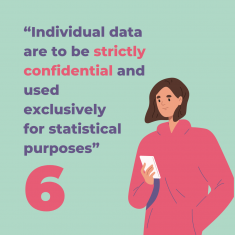
"Individual data collected by statistical agencies for statistical compilation, whether they refer to natural or legal persons, are to be strictly confidential and used exclusively for statistical purposes."
A fear that ‘Big Brother is watching us’ pervades 21st century society. We want information about our world, but not at the expense of our privacy and security. We are concerned when we think an organization or government knows a lot about us; our movements, finances, families. So when data are collected for statistics, either directly from respondents or automatically, people need assurances that the data will remain confidential and will not be used inappropriately: that NSOs are not Big Brother.
Such assurances come in the form of confidentiality policies and laws. They cover every aspect from the collection of data to how they are stored, processed and published. They protect the data themselves from accidental or malicious access, release or identification—known technically as confidentiality—and they protect the individuals who provide the data—known as privacy.
‘Microdata’, complete records of all the answers that people give when they complete a survey, are immensely useful to researchers. An aggregate statistic, such as average household income, can be a useful headline figure. But only microdata permit in-depth analysis of how different factors such as location, age, ethnicity or education influence the figures, to help disentangle causes. NSOs have detailed policies about who can access microdata and what they may do with it. Often they can only access it in secure computer rooms in the NSO’s premises. Names, dates of birth or other identifying features are replaced with unique numbers to anonymize the data.
Even when anonymized, an individual could be identifiable in data if they belong to a very small group. The more disaggregated the figures—that is, the more different characteristics used to define them—the greater the risk to confidentiality. For example, in the population of a town there might only be one 73-year-old ethnic minority woman with a master’s degree. NSOs have rules to determine how big a group must be before they can publish information about its members. Published figures might group together the women aged 70-74 to maintain their confidentiality.
Principle 6 also safeguards proper use of confidential data. While NSOs have access to tax files, border crossing records and census returns, there is no way for data to be used to identify tax evaders or track down undocumented migrants. NSOs follow strict rules, typically laid down in law, to ensure that data can only be used for statistical purposes.
A video about Principle 6 from the President of INE Spain, Mr. Juan Manuel Rodríguez Póo
Share your examples on Twitter or Facebook or other social media using #FPOS30 and tagging @unecestat and @es_INE!
- Principle 7: Legislation
-
Campaign led by Office for National Statistics of the United Kingdom and Statistical Committee of the Republic of Armenia from 25/04 to 06/05
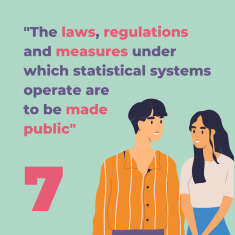
"The laws, regulations and measures under which the statistical systems operate are to be made public."
Statistical offices have among their staff and leaders many great statisticians and other kinds of experts, full of ideas and armed with wide-ranging skills. But this doesn’t mean that they are simply left on their own to produce statistics as they wish. On the contrary, as public servants every aspect of their work is governed by comprehensive laws. The plans, budgets and results of their work are subject to detailed scrutiny by elected officials and society at large.
Laws dealing with official statistics cover a huge range of areas: what constitutes ‘official statistics’, and the relationship between official statistics and government; how the chief statistician is appointed and removed from office; the responsibility for the budget of the entities in the statistical system. Laws also cover some of the more specific technical aspects of statistical production, such as how and when a census is conducted; the ways in which confidentiality is maintained, as we saw when principle 6 was under the spotlight; the rights and duties of the statistical office to access data sources collected by others; and many more.
Statistical legislation is important for two main reasons: to ensure the quality of the statistical work, and to maintain society’s trust in the independence and quality of the statistics. For such trust to be earned, the laws governing official statistics have to be not only strong but transparent. The public should be able to find out exactly what the rules are and how they are put into practice. Statistical offices publish or guide people to statistical laws via their websites. They also make available reports on compliance with the laws and annual reports that show how public money has been used. Statisticians in many countries report to public hearings, statistical councils, parliamentary or ministerial committees, to offer regular transparent access to information about how they uphold statistical legislation or to debate content when new statistical laws are developed.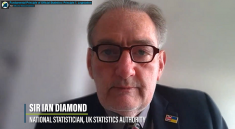
Share your examples on Twitter or Facebook or other social media using #FPOS30 and tagging @unecestat, @ONS and @armstat.am (Facebook)!
- Principle 8: National coordination
-
Campaign led by National institute of Statistics and Censuses of Argentina from 09/05 to 20/05
"Coordination among statistical agencies within countries is essential to achieve consistency and efficiency in the statistical system."
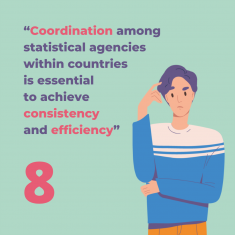
A country’s official statistics often fall under the responsibility of a range of different bodies, not limited to a single statistical institution. Statistics may be produced by or with the health service, the educational system, the central bank, the justice system, a range of ministries, and so on. On top of this, some countries have one centralized national statistical office, whereas others have offices at the regional or other sub-national level or subject-specific statistical offices. The key to maintaining consistency and credibility, then, is to ensure that all of these producers act in concert to serve the common goals of the national statistical system.
Coordination among these various offices is not only essential to ensure efficiency. It’s also a crucial means of earning trust. Discordant figures on a single topic from two different strands of the national statistical system could sow confusion and undermine users’ faith in their credibility. And any appearance of duplicated effort – two different offices producing statistics on the same thing, or asking respondents for the same information – could raise questions about inefficient use of public funds. As the promise of integrating data from different sources grows, people will become ever less willing to provide the same information to different bodies if they perceive them to be linked and think that they ought to be talking to each other and sharing information.
However the statistical system is organized, a core feature of a coordinated statistical system is that everything bearing the hallmark of ‘official statistics’ fulfils all the quality standards and other criteria laid out for them. The chief statistician bears the ultimate responsibility for assuring this coordination and quality. Coordination is achieved through laws, codes of practice, supervisory committees and joint development of workplans and budgets. Depending on the country, all official statistics may be channelled through a central body, or a ‘seal of approval’ may be provided to statistics that meet the required standards.Share your examples on Twitter or Facebook or other social media using #FPOS30 and tagging @unecestat!
- Principle 9: Use of international standards
-
Campaign led by Italian National Institute of Statistics and the National Bureau of Statistics of the Republic of Moldova from 23/05 to 03/06
"The use by statistical agencies in each country of international concepts, classifications and methods promotes the consistency and efficiency of statistical systems at all official levels."
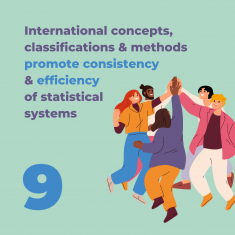
When people use statistics to investigate a problem or support a hypothesis, they often want to make comparisons. They may examine changes over time, look at different parts of a country, or compare figures from different countries. To be sure that they are not comparing apples with oranges, they need to be confident that the different figures they compare are measuring the same thing in the same way.
For example, if we want to know which part of the country has the highest level of youth unemployment, we need to be sure that the statistics for each different area count people in the same condition as being employed or unemployed. And we can’t compare a figure for 15-18 year-olds in one region with a figure for 16-25 year-olds in another.
The most efficient way to ensure fair comparisons is to establish standards, so that users don’t have to look up the precise details every time they use statistics. There are standards for concepts (what does ‘poverty’ mean?), for definitions (which people do we count as ‘living in a country’?) and methods (how do we derive a final GDP figure from raw data?).
While any country could develop its own standards, it’s much more useful for end users – and efficient for those who produce them—if those standards can be made and shared across all countries. When we hear reports in the news about inflation and economic growth in different countries, for instance, we can safely assume that all of the figures use the same standards which have long been established internationally. And countries don’t have to spend lots of time and money figuring out how to define and calculate things for which standards already exist.
When producers of statistics use international standards, the task of ensuring transparency (principle 3) is made much easier, as they can point users to the standards, mitigating any risk of doubts about their approach. Without published international standards, statistical producers could be accused—rightly or wrongly—of manipulating their methods to produce favourable statistics, or simply of making accidental errors by not carefully developing concepts, definitions and methods. In the same vein, a commitment to international standards protects official statistics producers from deliberate or inadvertent outside influence. It might ‘look better’ if an indicator were calculated in a certain way, but a policy of strict adherence to internationally-agreed standards means that official statisticians can hold steadfastly to their principles and steer clear of such influence.Share your examples on Twitter or Facebook or other social media using #FPOS30 and tagging @unecestat, @istat_en, @istat_it and @statisticamd!
- Principle 10: International cooperation
-
Campaign led by Central Statistics Office of Ireland and Statistics Poland plus the National Institute of Statistics of Romania from 06/06 to 17/06
"Bilateral and multilateral cooperation in statistics contributes to the improvement of systems of official statistics in all countries."
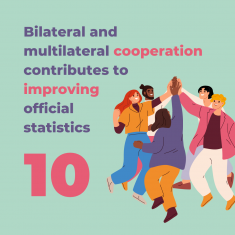
“Many hands make light work”, so the saying goes. And working together doesn’t just mean that things get done more quickly and cost-effectively; it can result in unique impacts that are greater than the sum of their parts.
The very existence of the United Nations is anchored in the conviction expressed in the Charter of the United Nations that we can “unite our strength” and “combine our efforts” to achieve goals beyond the capabilities of individual countries.
International cooperation in official statistics takes many forms. Countries work together to share what they’ve learned as they develop new ways to produce and publish statistics. With just one statistical system in each country, international exchange is crucial for statistical offices to learn, share and stay on top of their game. The hundreds of working groups convened by UNECE’s Conference of European Statisticians, the UN Statistics Division, Eurostat, OECD, regional statistical bodies in the UN and elsewhere, help countries to share what they experience and develop so others can benefit from it. This sharing happens in every aspect of statistics, from organizational management to how surveys are run, how statistics are calculated from raw data, and how results are published. Facilitated by international organizations such as UNECE, countries share everything from the code for their data editing software to the text of their statistical laws, and from the design of their census questionnaires to the job descriptions for hiring new staff.
International cooperation is not just about individual countries sharing their experiences. It’s also about working together to design and agree on things collectively: often cutting-edge new ideas which need the benefit of many points of view to make them work. As principle 9 showed, shared international standards are uniquely valuable. International groups working together can develop them based on the diverse views and priorities, so that the agreements they reach and the tools they develop are valuable for all.
International organizations and individual countries help one-another bilaterally too, by giving training to reinforce the skills and knowledge of staff in NSOs; by undertaking study visits; and by conducting independent external assessments of each other’s work.
International statistics bodies such as the Conference of European Statisticians and its global counterpart, the United Nations Statistical Commission, have formal processes for selecting topics to work on; establishing groups of experts to conduct the work; and endorsing the results. This formality isn’t just for show. Having been selected, consulted, revised and only finally endorsed when there is unanimous agreement, everything produced by these bodies enjoys a special status underpinned by the United Nations.
A rising tide of misinformation and disinformation can only be met by a united front of strong, independent, principle-bound providers of evidence. The Fundamental Principles themselves are the clearest illustration of the power of the collective—they arose as a result of countries working together. The passion they continue to spark among statisticians everywhere, witnessed during this 30th anniversary campaign, is testament to the continued truth that in statistics as in all things, nations are stronger together.National Institute of Statistics of Romania (NIS): “From two systems to one framework” – an interview with Mr. Ilie Dumitrescu, director of the NIS President Cabinet and one of the “founders” of the Fundamental Principles of Official Statistics: part 1, part 2 and part 3
Share your examples on Twitter or Facebook or other social media using #FPOS30 and tagging @unecestat, @CSOIreland, @StatPoland and @ro_statistics!

